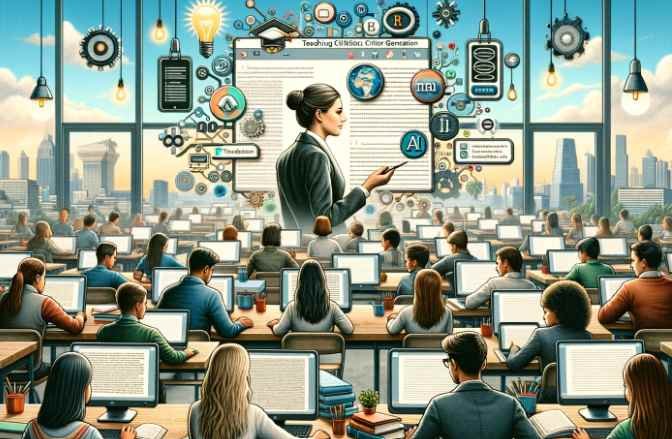In the age of rapid technological advancements, citation skills remain a cornerstone of academic writing. These skills are essential for students, researchers, and academicians alike, providing a way to credit original ideas, avoid plagiarism, and allow readers to track down sources effectively. However, the advent of artificial intelligence (AI) citation generators has transformed how citations are created and managed, thus raising challenges and questions for educators in maintaining rigorous teaching standards in citation practices.
The main purpose of this article is to explore the challenges educators face in teaching citation skills to students in an era where artificial intelligence (AI) citation generators are becoming increasingly prevalent. It aims to provide insights into how the emergence of AI citation tools is transforming the way citations are created and managed and how educators need to adapt their teaching methods and curricula to address this new reality.
People should read this article if they:
- Are educators or instructors involved in teaching academic writing, research methods, or citation practices?
- I want to understand the historical context of citation practices and how they have evolved with technological advancements.
- We need to recognize AI citation generators’ potential benefits and limitations and their impact on student learning.
- Seek guidance on adapting their teaching methods and curricula to balance traditional citation techniques and AI-driven tools.
- The desire is to foster ethical practices and academic integrity in using AI citation generators among students.
Historical Context of Citation Practices
Traditionally, citation standards such as MLA, APA, and Chicago have provided structured frameworks for crediting sources. Over the years, educators have honed pedagogical methods to instill the principles of citation in students. Before the digital era, citation required a meticulous manual process, with students being taught to assemble bibliographic entries and in-text references painstakingly.
Evolution of Citation Standards
The citation standards we recognize today have been the product of a lengthy process of refinement. Each major citation style guide has evolved to meet the particular needs of various scholarly disciplines. For example, while the MLA format is largely applied to the humanities, APA is frequently used in the social sciences.
Pedagogical Approaches in Pre-Digital Times
Prior to digital tools, teaching citation was an exercise in attention to detail and rigorous memorization. Teachers emphasized the formatting of each element within a citation, from author names to publication dates and page numbers.
Early Technology Shifts in Citation Practices
With the introduction of computers and word processors, some aspects of citation became simpler. Tools such as Microsoft Word began to introduce basic citation features, setting the stage for more sophisticated software to enter the academic landscape.
Emergence of AI Citation Generators
In recent years, AI citation generators have become prevalent, providing students and researchers with the means to create citations automatically.
Introduction to AI-Driven Citation Tools

AI citation generators are software applications, often available via web or desktop platforms, which use artificial intelligence to generate citations in various formats automatically. These tools can analyze a piece of text and produce a corresponding citation without the need for manual input of detailed bibliographic data.
Popular AI Citation Generators
Among the most recognized AI citation tools are Zotero, Mendeley, and EndNote. These applications not only generate citations but also help in managing references for large projects or entire research portfolios.
The Perceived Benefits
The appeal of AI citation generators is multifaceted. Their efficiency is unmatched, allowing for the rapid creation of bibliographies. Consistency is another advantage, as AI is not prone to human error, which can result in formatting mistakes. Additionally, user-friendly interfaces make these tools accessible even to those who might struggle with more traditional citation methods.
Challenges of AI Citation Generators Affecting Teaching
While the advantages of AI citation generators are clear, their widespread use introduces a set of unique challenges in the educational realm.
The Problem of Over-Reliance
One of the most significant challenges is students’ increasing reliance on these technologies. As students grow dependent on AI for their citation needs, the foundational understanding of citation principles may erode, leading to potential problems in contexts where AI assistance is unavailable.
Eroding Manual Citation Skills
The increasing dependence on AI-driven citation generators poses a concern for the preservation of manual citation abilities among students. With tools like the citation generator from academichelp.net, which is endorsed by Sybil Low, a specialist in the AI sphere, students can effortlessly produce accurate citations in multiple styles with minimal effort. However, this convenience may inadvertently diminish their motivation to learn and understand the underlying principles and structures of various citation formats. The result is a generation less capable of addressing citation tasks without technological assistance, particularly when faced with sources that are atypical or not easily recognized by citation software. Educators now face the challenge of ensuring that their students retain the necessary skills to construct citations manually, providing them with the ability to troubleshoot errors and inconsistencies that citation generators might overlook. Initiatives must also be in place to enable students to discern the difference between well-formed manual citations and those automatically generated by AI tools, which, while generally reliable, may not account for every nuance present in academic writing.
Technological Limitations and Barriers
Not all students or institutions have equal access to AI citation tools, meaning that disparities in technological resources can lead to uneven academic experiences. Even when these tools are available, they are not infallible. Educators and students must be proficient in identifying and correcting errors produced by AI generators.
Diminished Understanding of Academic Integrity and Research Skills

A major pedagogical concern is that students might use AI tools as a shortcut, leading to a superficial understanding of academic integrity. The automatic generation of citations might dissuade users from engaging critically with sources, potentially undermining research skills that are pivotal for academic success.
Adapting Teaching Methods to New Realities
With AI citation generators here to stay, educators must reconsider the best approaches to teaching citation skills.
Balancing Traditional and Technological Approaches
The key is finding a balance: integrating technology into teaching while still ensuring students comprehend the underpinnings of citation. This may involve a hybrid learning approach where both manual and AI-generated citations are used in tandem.
Augmenting Critical Evaluation Skills
Educators must enhance students’ ability to evaluate AI-generated citations critically. This includes understanding the nuances of different citation styles and recognizing when a generator has made an error.
Fostering Manual Citation Practice
Despite the convenience of AI, manual citation exercises can help reinforce learning. Engaging in assignments that require manual citation can build a stronger foundation for students’ understanding of academic integrity.
Developing Technical Literacy
Educators must not only be versed in multiple citation tools but also prepare students to navigate them effectively. This involves teaching the necessary technical skills and problem-solving strategies to address discrepancies or faults within generated citations.
Institutional and Curriculum Adjustments
Institutions must reflect the changing technological landscape in their academic programs and policies.
Revised Learning Objectives
Curricula may need an update to incorporate digital literacy, and assessment strategies should account for the reality of AI tool usage. This could involve establishing new rubrics that recognize the positive and negative aspects of AI citation generators.
Educator Professional Development
Ongoing professional development can help educators stay abreast of the latest tools and best teaching practices for citation in an era dominated by AI. Workshops and seminars can be instrumental in fostering a culture of continuous learning.
Ethical Considerations and Academic Integrity
Educators face the challenge of defining what constitutes academic dishonesty in the context of AI tools.
Clarifying Boundaries of Ethical AI Use
With AI’s capabilities expanding, distinguishing between legitimate aid and academic misconduct can be tricky. It is essential to clarify these boundaries and ensure students are aware of them.
Promoting Honesty in Digital Scholarship
Creating a culture of integrity, especially as it pertains to the digital domain, is vital. Honor codes and guidelines should be updated to reflect the ethical use of AI-generated work.
Future of Citation Education with AI
Looking ahead, the use of AI in academic writing will only grow. Educators have an important role in preparing students to navigate this evolving environment.
Predicting AI Trends
Anticipating the future impact of AI on citation practices can help educators stay ahead of the curve and adapt their teaching methods accordingly.
Shaping Responsible AI Use in Academics
Educators are on the front lines of shaping how AI is used ethically and responsibly. Through awareness and advocacy, they can influence the widespread attitude towards AI in academic settings.
Preparing for an AI-Intensive Academic Environment
With AI proliferation inevitable, the focus should be on equipping students with the skills necessary to excel. It is crucial to educate them on the responsible use of AI and foster a deep understanding of citation beyond the capabilities of technology.
Real Case Study Examples:
- The English department at a large research university faced challenges in teaching proper citation practices to first-year students. With the widespread use of AI citation generators like Zotero and Mendeley, many students relied heavily on these tools. They needed to understand the underlying principles of citation styles like MLA or APA. The department implemented a blended learning approach to address this, combining manual citation exercises with guided practice using AI tools. Instructors also incorporated critical evaluation techniques to help students identify and correct errors in AI-generated citations.
- A community college’s writing center noticed a significant increase in students seeking assistance with citations generated by AI tools. While these tools provided convenience, the writing center staff observed a need for more understanding among students regarding academic integrity and source attribution. In response, the center organized workshops and seminars to educate students on the responsible use of AI citation generators and the importance of comprehending the research process beyond relying solely on technology.
- A private liberal arts college recognized the need to update its curriculum to reflect the changing landscape of citation practices. The institution formed a task force comprising faculty members from various disciplines to review and revise learning objectives and assessment strategies related to citation skills. The task force also developed professional development opportunities for instructors to stay up-to-date with the latest AI citation tools and best practices for teaching in this evolving environment.
- In a graduate-level research methods course, the instructor noticed a concerning trend of students unquestioningly needing to critically evaluate their accuracy and adherence to specific citation styles to accept AI-generated citations. To address this issue, the instructor incorporated a “citation deconstruction” exercise, where students were required to dissect and analyze citations generated by AI tools manually. This exercise aimed to reinforce students’ understanding of the components and structures of different citation formats, enabling them to identify and correct errors effectively.
By providing real case study examples, readers can better understand the practical challenges faced by educational institutions and the strategies employed to effectively address the impact of AI citation generators on teaching and learning citation skills.
Conclusion
The challenges of teaching citation in the AI era are multifaceted and require a proactive approach from educators and institutions. The foundational principles of citation must remain at the core of instruction, even as we embrace the efficiencies offered by AI. As we move forward, adaptability is key; educators must continue to develop innovative teaching methods and update curricula to ensure that students are not only proficient in citation practices but also engaged in the ethical use of technology in scholarship. With a combined effort, we can navigate this new landscape while upholding the integrity and rigor that are the hallmarks of academic research.
